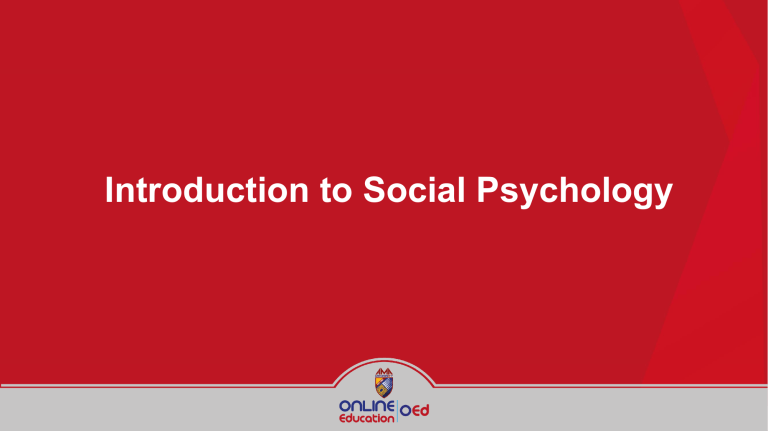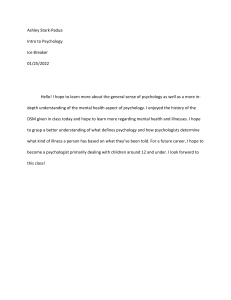
Introduction to Social Psychology Introduction to Social Psychology • Objectives: • Define social psychology and explain what it does. • Examine the methods that make social psychology a science. • Develop a working knowledge of psychology’s content domains Social Psychology Defined Social Psychology says that: 1. We construct our social reality 2. Social intuitions are very influential as it affects a person’s perspectives, making it dangerous as well. 3. Social influences shape our behavior. Social Psychology Defined 4. Personal attitudes and dispositions also shape behavior. How we view and deal with things molds our behavior. 5. Social behavior is biologically rooted. External forces or situations are not the only factors that affect people’s behavior. 6. Social psychology’s principles are applicable in life Social Psychology Defined Summing Up: Social Psychology’s Big Ideas • Social psychology is the scientific study of how people think about, influence, and relate to one another. Its central themes include the following: • How we construe our social worlds • How our social intuitions guide and sometimes deceive us Social Psychology Defined • How our social behavior is shaped by other people, by our attitudes and personalities, and by our biology • How social psychology’s principles apply to our everyday lives and to various other fields of study Social Psychology and Human Values Examples of value judgments: • Defining a good life. • Psychological advice may also reflect the advice giver’s personal values. • Forming Concepts. • Labeling Research Methods in Social Psychology Hypotheses Testing • Because of social psychologists unending quest about life, they tend to create a lot of ideas formulated into theories and turn it into an intelligent guess through making | testable predictions or what we called a hypothesis. Research Methods in Social Psychology For someone to be able to tell that they have found a useful theory, it must: 1. effectively summarize many observations, and 2. make clear predictions that we can use to confirm or modify the theory, generate new exploration, and suggest practical applications. CORRELATIONAL RESEARCH Social psychology has different kinds of studies that can vary from a method (correlational/experimental) or location (laboratory/field). • Correlation and Causation – Correlations is the study of naturally occurring relationships among variables • Survey Research – This kind of study can be used to measure variables such as time on social media, for instance. CORRELATIONAL RESEARCH Representativeness indicates how closely the sample reflects the population under study. Random sampling, wherein every person in the population being studied has an equal chance of being included in the survey. EXPERIMENTAL RESEARCH • There are just two things that are crucial when it comes to this kind of research; first is the manipulation of variables and second is the random assignment in a group. • Control: Manipulating Variables Independent variable is experimental factor that a researcher manipulates. Dependent variable is the variable being measured • Random Assignment: The Great Equalizer –is the process of assigning participants to the conditions of an experiment such that all persons have the same chance of being in a given condition. There are things that researchers dealing with experiments should do: • Give/demand characteristics of the experiment to the participants to give them a background of the study for them to be aware of what is the research all about. • Ensure informed consent. • Deception is only allowed if needed and justifiable • Make sure participants and bystanders are safe and comfortable. • Make every information regarding participants confidential. • At the end of the experiment, debrief participants. Research Methods in Social Psychology • Social psychologists systematize their ideas and findings into theories • Most social-psychological research is either correlational or experimental • When possible, social psychologists prefer to conduct experiments that explore cause and effect. • In creating experiments, social psychologists sometimes stage situations that engage people’s emotions. References • Myers, G. (2012). Social Psychology (11th Edition) McGraw Hill Higher Education. • Myers, G. (2014). Exploring Social Psychology (7th Edition) McGraw Hill Higher Education.





